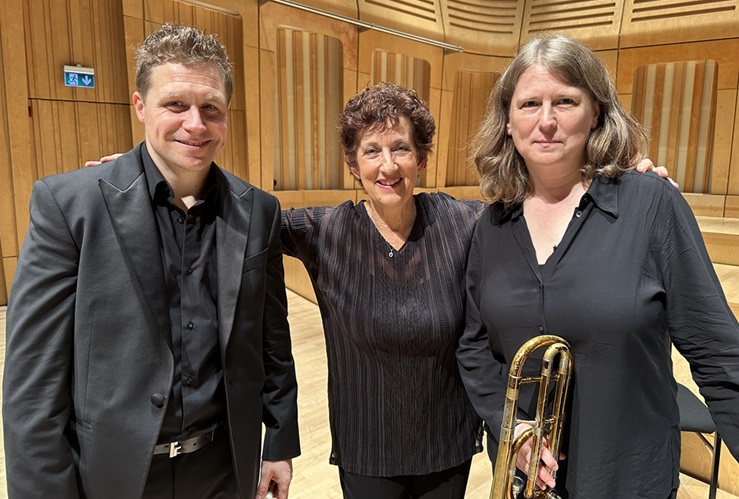
Featuring: Helen Vollam (trombone), Philip Cobb (trumpet & cornet), Elizabeth Burley (piano)
RWCM&D
Cardiff
Friday 18th October

Handel’s ‘Happy We’ from his opera ‘Acis and Galatea’ summed up the ‘joys and charms’ felt in listening to this recital of balanced musical synchronisation.
Opening with the duet for soprano and tenor voice, Philip Cobb and Helen Vollam sparred playfully off each other in pastoral counterpoint, never in tension – a feature added to throughout by the subtle accompaniment of pianist Elizabeth Burley.
Mischievous and the melancholic
From then on it was an hour or so of cultured expositions: Dan Jenkins’ concise ‘Exuberance & Hymn’ with its brittle fanfare statements leading into a paean of contentment was balanced by the rich romanticism of Brahms ‘So lass uns wandern!’ that captured the old composer’s affectionate (if unfulfilled) longing for the ‘dark eyes’ of his pupil Elisabeth von Herzogenberg.
The clever characterisation of Julia Simpson’s entrepreneurial market gardening goblin in ‘Come Buy!’ was a neat mix of the mischievous and the melancholic.
The clever characterisation of Julia Simpson’s entrepreneurial market gardening goblin in ‘Come Buy!’ was a neat mix of the mischievous and the melancholic.
Wonderfully played
Definition of time and place came with the homage to the Hollywood compositional greats of Korngold, Williams and Newman in a wonderfully played triptych of ‘Dogberry & Verges’, ‘Born on the 4th July’ and ‘Street Scene’.
Korngold’s character portrait of the two police constables from Shakespeare’s ‘Much Ado About Nothing’ captured their dogged seriousness and comedic ineptitude to a tee – Dixon of Dock Green meets Officer Dibble from Top Cat.
Korngold’s character portrait of the two police constables from Shakespeare’s ‘Much Ado About Nothing’ captured their dogged seriousness and comedic ineptitude to a tee – Dixon of Dock Green meets Officer Dibble from Top Cat.
The famous trumpet theme from Oliver Stone’s anti-war movie ached with the elegiac defiance of an 1970s America of lost honour and needless sacrifice, whilst the contrast offered with a 1930s country of eternal urban optimism and the suave millionaire King Vidor fancies of Alfred Newman’s sublime film score was as delight.
Peter Graham’s ‘Meditation’ offered a link to the brass band hinterland of Philip Cobb (a theme from the test-piece ‘Triumph of Time’) as he led on cornet with glowing tenderness.
A superb recital closed with Chick Corea’s self-identifying ‘Armando’s Rhumba’ from his 1976 album ‘My Spanish Heart’ and the delightful encore of a Bach organ prelude.
Iwan Fox









